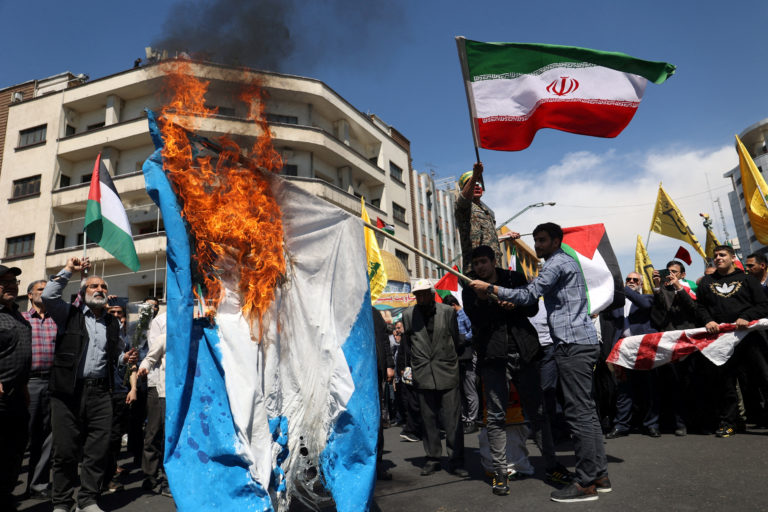Timeline: Iran, Israel’s war… how it all started

FILE PHOTO: Iranians burn an Israeli flag during a rally marking Quds Day and the funeral of members of the Islamic Revolutionary Guard Corps who were killed in a suspected Israeli airstrike on the Iranian embassy complex in the Syrian capital Damascus, in Tehran, Iran, April 5, 2024. Majid Asgaripour/WANA (West Asia News Agency) via REUTERS ATTENTION EDITORS – THIS IMAGE HAS BEEN SUPPLIED BY A THIRD PARTY/File Photo
Israeli Prime Minister Benjamin Netanyahu affirmed his nation’s determination to secure victory following the military’s interception of nearly all of the over 300 drones and missiles launched by Iran, marking a significant escalation in the Middle East conflict.
This direct Iranian assault on Israel, subsequent to a suspected Israeli airstrike on Tehran’s embassy compound in Damascus on April 1, signals a broader intensification since the Gaza war last year, yet their hostility traces back decades.
Iran and Israel, enduring as the region’s fiercest adversaries, have engaged in a protracted history of covert operations and clandestine attacks across various domains, including land, sea, air, and cyberspace.
The timeline:
In 2010, Stuxnet, a nefarious computer virus thought to be crafted by the United States and Israel, targeted Iran’s Natanz nuclear site, striking its uranium enrichment facility. This marked the inaugural publicized cyber assault on industrial infrastructure.
2012 – A bomb planted on his car by a motorcyclist in Tehran claimed the life of Iranian nuclear scientist Mostafa Ahmadi-Roshan. A city official pointed fingers at Israel for the attack.
2018 – Israeli Prime Minister Benjamin Netanyahu celebrates U.S. President Donald Trump’s exit from the Iran nuclear deal, a move he has long advocated for.
Describing it as a significant moment in history, Netanyahu praises Trump’s decision. Additionally, in May, Israel reported targeting Iranian military sites in Syria, responding to rocket attacks from Iranian forces stationed there, who were supporting President Bashar al-Assad’s regime in the ongoing civil war.
In 2020, Israel celebrated the elimination of General Qassem Soleimani, the commander of Iran’s Revolutionary Guards abroad, taken out by an American drone strike in Baghdad.
In retaliation, Iran launched missile strikes on Iraqi bases hosting American troops, resulting in approximately 100 U.S. military personnel sustaining injuries.
2021 – Iran accuses Israel of orchestrating the assassination of Mohsen Fakhrizadeh, a figure Western intelligence deems as the architect behind Iran’s clandestine nuclear weapons program, which Tehran constantly denies having.
2022 – During his inaugural visit to Israel as president, Joe Biden and Israeli Prime Minister Yair Lapid joined forces to sign a collaborative pledge aimed at preventing Iran from obtaining nuclear weapons.
This historic agreement, known as the “Jerusalem Declaration,” symbolized a unified front between allies who have historically held differing views on diplomatic approaches toward Tehran.
- Left to suffer: Retirees live in penury as Niger government defaults over benefits
- TIMELINE: How and why Odili, Wike fell apart
- From Kano election hero to embattled governor… timeline of Abba Yusuf’s case
The signing followed Biden’s acknowledgment in a television interview that he remained receptive to utilizing force as a last resort against Iran, signaling a gesture of solidarity with Israel’s advocacy for a credible military deterrent from global powers.
In 2024, an attack believed to be carried out by Israeli forces targets the Iranian embassy in Damascus, resulting in the deaths of seven Islamic Revolutionary Guard officers, including two high-ranking commanders. Israel maintains ambiguity regarding its involvement.
In retaliation, Iran launches a significant barrage of drones and missiles on April 13, marking an unprecedented direct assault on Israeli soil.

